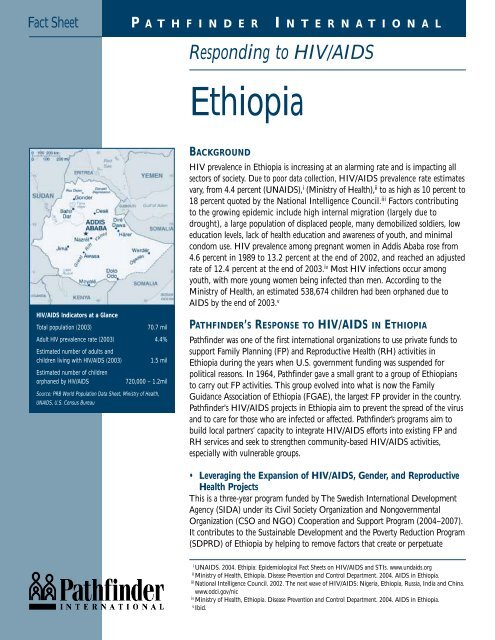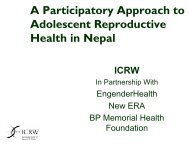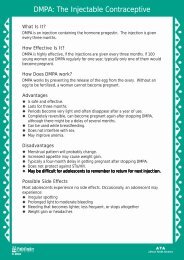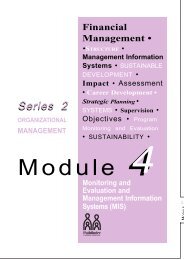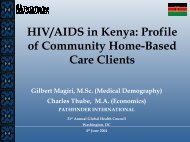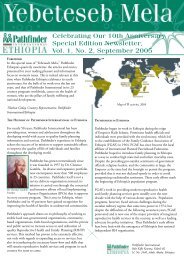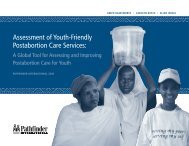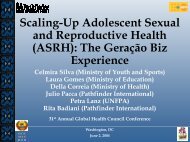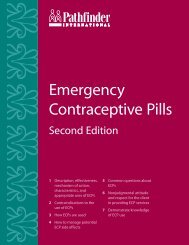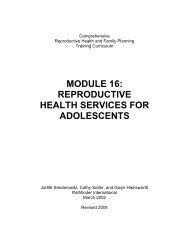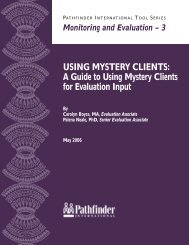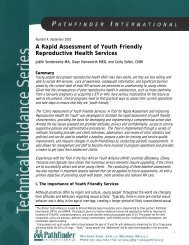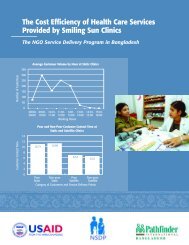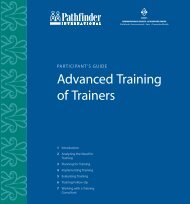Ethiopia - Pathfinder International
Ethiopia - Pathfinder International
Ethiopia - Pathfinder International
Create successful ePaper yourself
Turn your PDF publications into a flip-book with our unique Google optimized e-Paper software.
Fact Sheet P A T H F I N D E R I N T E R N A T I O N A L<br />
Responding to HIV/AIDS<br />
<strong>Ethiopia</strong><br />
HIV/AIDS Indicators at a Glance<br />
Total population (2003)<br />
70.7 mil<br />
Adult HIV prevalence rate (2003) 4.4%<br />
Estimated number of adults and<br />
children living with HIV/AIDS (2003) 1.5 mil<br />
Estimated number of children<br />
orphaned by HIV/AIDS<br />
720,000 – 1.2mil<br />
Source: PRB World Population Data Sheet, Ministry of Health,<br />
UNAIDS, U.S. Census Bureau<br />
BACKGROUND<br />
HIV prevalence in <strong>Ethiopia</strong> is increasing at an alarming rate and is impacting all<br />
sectors of society. Due to poor data collection, HIV/AIDS prevalence rate estimates<br />
vary, from 4.4 percent (UNAIDS), i (Ministry of Health), ii to as high as 10 percent to<br />
18 percent quoted by the National Intelligence Council. iii Factors contributing<br />
to the growing epidemic include high internal migration (largely due to<br />
drought), a large population of displaced people, many demobilized soldiers, low<br />
education levels, lack of health education and awareness of youth, and minimal<br />
condom use. HIV prevalence among pregnant women in Addis Ababa rose from<br />
4.6 percent in 1989 to 13.2 percent at the end of 2002, and reached an adjusted<br />
rate of 12.4 percent at the end of 2003. iv Most HIV infections occur among<br />
youth, with more young women being infected than men. According to the<br />
Ministry of Health, an estimated 538,674 children had been orphaned due to<br />
AIDS by the end of 2003. v<br />
PATHFINDER’S RESPONSE TO HIV/AIDS IN ETHIOPIA<br />
<strong>Pathfinder</strong> was one of the first international organizations to use private funds to<br />
support Family Planning (FP) and Reproductive Health (RH) activities in<br />
<strong>Ethiopia</strong> during the years when U.S. government funding was suspended for<br />
political reasons. In 1964, <strong>Pathfinder</strong> gave a small grant to a group of <strong>Ethiopia</strong>ns<br />
to carry out FP activities. This group evolved into what is now the Family<br />
Guidance Association of <strong>Ethiopia</strong> (FGAE), the largest FP provider in the country.<br />
<strong>Pathfinder</strong>'s HIV/AIDS projects in <strong>Ethiopia</strong> aim to prevent the spread of the virus<br />
and to care for those who are infected or affected. <strong>Pathfinder</strong>’s programs aim to<br />
build local partners’ capacity to integrate HIV/AIDS efforts into existing FP and<br />
RH services and seek to strengthen community-based HIV/AIDS activities,<br />
especially with vulnerable groups.<br />
• Leveraging the Expansion of HIV/AIDS, Gender, and Reproductive<br />
Health Projects<br />
This is a three-year program funded by The Swedish <strong>International</strong> Development<br />
Agency (SIDA) under its Civil Society Organization and Nongovernmental<br />
Organization (CSO and NGO) Cooperation and Support Program (2004–2007).<br />
It contributes to the Sustainable Development and the Poverty Reduction Program<br />
(SDPRD) of <strong>Ethiopia</strong> by helping to remove factors that create or perpetuate<br />
i UNAIDS. 2004. Ethipia: Epidemiological Fact Sheets on HIV/AIDS and STIs. www.undaids.org<br />
ii Ministry of Health, <strong>Ethiopia</strong>. Disease Prevention and Control Department. 2004. AIDS in <strong>Ethiopia</strong>.<br />
iii National Intelligence Council. 2002. The next wave of HIV/AIDS: Nigeria, <strong>Ethiopia</strong>, Russia, India and China.<br />
www.odci.gov/nic<br />
iv Ministry of Health, <strong>Ethiopia</strong>. Disease Prevention and Control Department. 2004. AIDS in <strong>Ethiopia</strong>.<br />
v Ibid.
poverty. The project has four objectives: (1) Contribute to<br />
the reduction of the spread of STIs and HIV/AIDS, and<br />
reduce stigma and discrimination against and improve<br />
the quality of life of people living with HIV/AIDS and<br />
their families; (2) Increase access to quality RH services<br />
through diversified service delivery approaches and<br />
geographical expansion of programs; (3) Contribute to<br />
the national effort to increase access to adolescent RH<br />
information and services and; (4) Enhance the capacity<br />
of sub-grantee NGOs/CSOs to enable them to manage<br />
integrated quality HIV/AIDS, FP, and family health<br />
programs and services toward sustainable strategies and<br />
accountability. The key component of the SIDA project<br />
is building the capacity of CSOs/NGOs and enhancing<br />
the capacity of <strong>Pathfinder</strong> <strong>Ethiopia</strong> in HIV/AIDS care<br />
and support interventions. The project is designed to<br />
complement existing program city administrations (Addis<br />
Ababa and Dire Dawa) through 12 civic organizations<br />
and 11 local NGOs.<br />
• Comprehensive Private Sector Reproductive<br />
Health Program<br />
This six-year program, funded by the Packard Foundation,<br />
is designed to increase the accessibility and availability of<br />
FP and RH, including HIV prevention, services through<br />
the private sector in three major regions of <strong>Ethiopia</strong><br />
(Addis Ababa, Amhara, and Oromia). <strong>Pathfinder</strong> trains<br />
private sector physicians, nurses, midwives, and community<br />
health workers to offer a range of preventive and clinical<br />
services. The program seeks to reduce fertility and maternal<br />
and infant mortality, as well as to increase knowledge of,<br />
and access to, Sexually Transmitted Infections (STI) and<br />
HIV/AIDS counseling and preventive services. Phase II of<br />
the program, which began in January 2002, includes the<br />
implementation of an adolescent sexual and reproductive<br />
health component in selected areas. <strong>Pathfinder</strong> supports<br />
youth groups, the media, and faith-based organizations to<br />
provide information and services to <strong>Ethiopia</strong>n youth,<br />
particularly on STIs and HIV/AIDS prevention. Phase II<br />
also includes expansion of outreach efforts to all major<br />
marketplaces in the ten target woredas. With the help of<br />
public address systems, marketplace agents spread the word<br />
about FP, STIs, and HIV/AIDS, and then make referrals to<br />
nearby clinics.<br />
• Family Planning and Reproductive<br />
Health Project<br />
In 2002, <strong>Pathfinder</strong> was awarded a five-year USAID<br />
agreement to support FP and RH activities in three focus<br />
regions of <strong>Ethiopia</strong> (Amhara, Oromia, and SNNPR).<br />
The project has been expanded to two more regional<br />
states, Tigray and Benishangul–Gumuz, and one City<br />
Administration: Addis Ababa. The project’s primary<br />
emphasis is on providing integrated services through<br />
traditional and alternative service-delivery mechanisms.<br />
This includes community-based HIV/AIDS services, such<br />
as home-based care, behavior change communication,<br />
condom promotion, referrals for voluntary counseling<br />
and testing, prevention of mother-to-child transmission<br />
services, and working with vulnerable populations such as<br />
youth and long distance drivers. <strong>Pathfinder</strong> is currently<br />
working with 46 implementing partner organizations<br />
spread over five regions, 42 zones, 250 woredas, and two<br />
special woredas, with funding from various sources.<br />
Twenty-three of the 46 partner organizations specifically<br />
implement integrated RH and FP and HIV/AIDS care<br />
and support programs.<br />
FOR MORE INFORMATION, CONTACT:<br />
Tilahun Giday, Country Representative<br />
<strong>Pathfinder</strong> <strong>International</strong>/<strong>Ethiopia</strong><br />
P.O. Box 12655<br />
Addis Ababa, <strong>Ethiopia</strong><br />
Tel:+251 (1) 613-330<br />
Fax:+251 (1) 614-209<br />
Email: TGiday@pathfind.org<br />
www.pathfind.org • info@pathfind.org<br />
0506/5k


